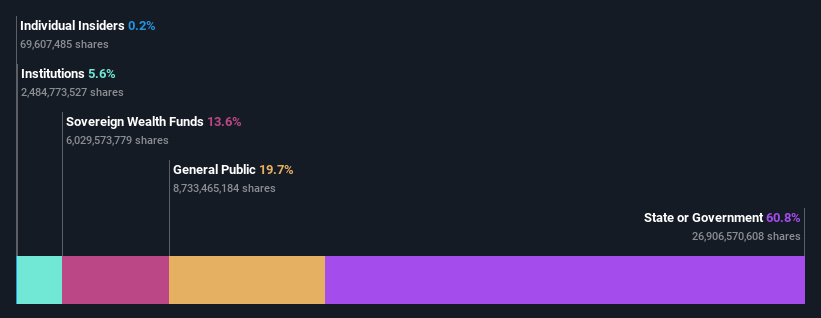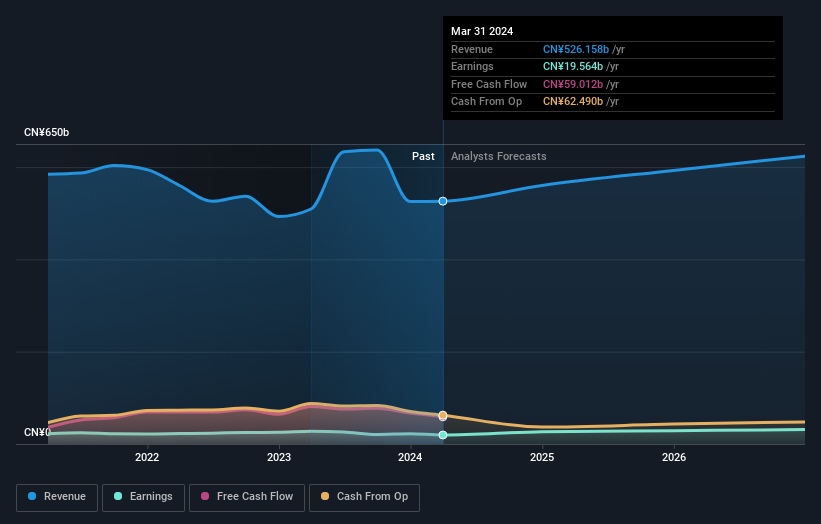Stock Analysis
The People's Insurance Company (Group) of China Limited's (HKG:1339) largest shareholders are state or government with 61% ownership, individual investors own 20%

Key Insights
- The considerable ownership by state or government in People's Insurance Company (Group) of China indicates that they collectively have a greater say in management and business strategy
- 61% of the company is held by a single shareholder (Ministry of Finance of the People's Republic of China)
- Using data from analyst forecasts alongside ownership research, one can better assess the future performance of a company
Every investor in The People's Insurance Company (Group) of China Limited (HKG:1339) should be aware of the most powerful shareholder groups. And the group that holds the biggest piece of the pie are state or government with 61% ownership. That is, the group stands to benefit the most if the stock rises (or lose the most if there is a downturn).
Meanwhile, individual investors make up 20% of the company’s shareholders.
In the chart below, we zoom in on the different ownership groups of People's Insurance Company (Group) of China.
See our latest analysis for People's Insurance Company (Group) of China

What Does The Institutional Ownership Tell Us About People's Insurance Company (Group) of China?
Institutions typically measure themselves against a benchmark when reporting to their own investors, so they often become more enthusiastic about a stock once it's included in a major index. We would expect most companies to have some institutions on the register, especially if they are growing.
As you can see, institutional investors have a fair amount of stake in People's Insurance Company (Group) of China. This implies the analysts working for those institutions have looked at the stock and they like it. But just like anyone else, they could be wrong. When multiple institutions own a stock, there's always a risk that they are in a 'crowded trade'. When such a trade goes wrong, multiple parties may compete to sell stock fast. This risk is higher in a company without a history of growth. You can see People's Insurance Company (Group) of China's historic earnings and revenue below, but keep in mind there's always more to the story.

We note that hedge funds don't have a meaningful investment in People's Insurance Company (Group) of China. Our data shows that Ministry of Finance of the People's Republic of China is the largest shareholder with 61% of shares outstanding. With such a huge stake in the ownership, we infer that they have significant control of the future of the company. National Council for Social Security Fund is the second largest shareholder owning 14% of common stock, and BlackRock, Inc. holds about 1.5% of the company stock.
Researching institutional ownership is a good way to gauge and filter a stock's expected performance. The same can be achieved by studying analyst sentiments. There are a reasonable number of analysts covering the stock, so it might be useful to find out their aggregate view on the future.
Insider Ownership Of People's Insurance Company (Group) of China
The definition of an insider can differ slightly between different countries, but members of the board of directors always count. Management ultimately answers to the board. However, it is not uncommon for managers to be executive board members, especially if they are a founder or the CEO.
I generally consider insider ownership to be a good thing. However, on some occasions it makes it more difficult for other shareholders to hold the board accountable for decisions.
Our information suggests that The People's Insurance Company (Group) of China Limited insiders own under 1% of the company. Being so large, we would not expect insiders to own a large proportion of the stock. Collectively, they own HK$358m of stock. It is good to see board members owning shares, but it might be worth checking if those insiders have been buying.
General Public Ownership
With a 20% ownership, the general public, mostly comprising of individual investors, have some degree of sway over People's Insurance Company (Group) of China. While this size of ownership may not be enough to sway a policy decision in their favour, they can still make a collective impact on company policies.
Next Steps:
I find it very interesting to look at who exactly owns a company. But to truly gain insight, we need to consider other information, too. To that end, you should be aware of the 2 warning signs we've spotted with People's Insurance Company (Group) of China .
If you are like me, you may want to think about whether this company will grow or shrink. Luckily, you can check this free report showing analyst forecasts for its future.
NB: Figures in this article are calculated using data from the last twelve months, which refer to the 12-month period ending on the last date of the month the financial statement is dated. This may not be consistent with full year annual report figures.
New: Manage All Your Stock Portfolios in One Place
We've created the ultimate portfolio companion for stock investors, and it's free.
• Connect an unlimited number of Portfolios and see your total in one currency
• Be alerted to new Warning Signs or Risks via email or mobile
• Track the Fair Value of your stocks
Have feedback on this article? Concerned about the content? Get in touch with us directly. Alternatively, email editorial-team (at) simplywallst.com.
This article by Simply Wall St is general in nature. We provide commentary based on historical data and analyst forecasts only using an unbiased methodology and our articles are not intended to be financial advice. It does not constitute a recommendation to buy or sell any stock, and does not take account of your objectives, or your financial situation. We aim to bring you long-term focused analysis driven by fundamental data. Note that our analysis may not factor in the latest price-sensitive company announcements or qualitative material. Simply Wall St has no position in any stocks mentioned.
Have feedback on this article? Concerned about the content? Get in touch with us directly. Alternatively, email editorial-team@simplywallst.com
About SEHK:1339
People's Insurance Company (Group) of China
An investment holding company, provides insurance products and services in the People’s Republic of China and Hong Kong.
Undervalued with excellent balance sheet and pays a dividend.

